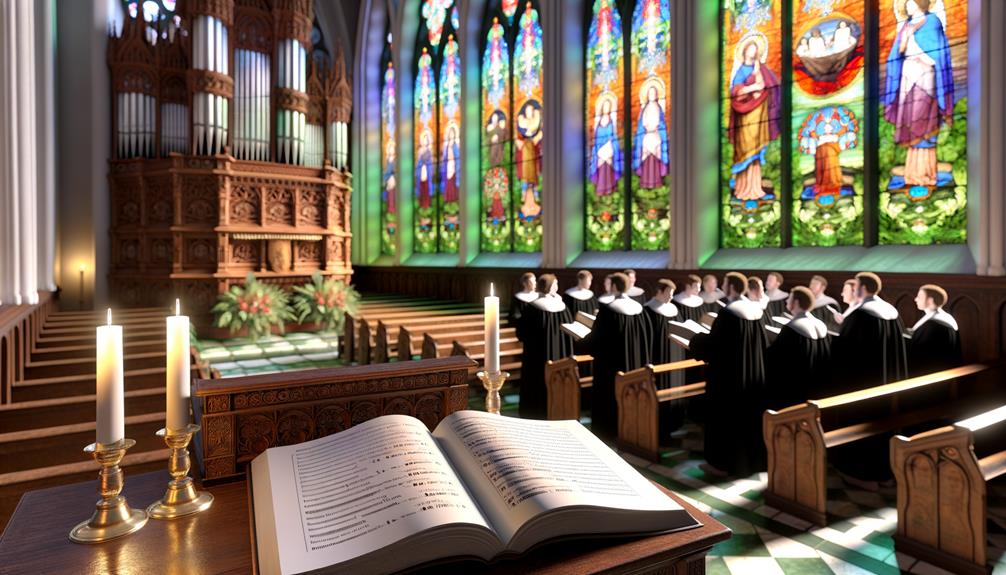Laud Meaning in the Bible: Praise and Worship
In biblical terms, ‘laud’ signifies an intense act of praise and reverence directed towards God, emanating deep admiration and worship. It captures the exalted acknowledgment of divine grandeur, often expressed through hymns, psalms, and prayers.
The origins of ‘laud’ trace back to Hebrew and Greek languages, where it translates to ‘praise’ or ‘glorify’. Central to the Psalms and echoed in the New Covenant, lauding God underscores the theological significance of worship in the scripture.
This reflection of spiritual gratitude and veneration plays an essential role in both communal and individual expressions of faith, offering profound insights into the essence of biblical worship practices.

Laud Meaning in the Bible: Praising God with Reverence and Joy
| Term | Laud |
|---|---|
| Biblical Usage | Found in Psalms and older Bible translations (e.g., Psalm 117:1 in KJV) |
| Meaning | To praise, glorify, or extol, especially in worship of God |
| Spiritual Insight | Emphasizes heartfelt adoration and recognition of God’s greatness |
| Synonyms in Scripture | Praise, exalt, glorify |
| Context of Use | Often appears in songs, prayers, and liturgical expressions |
| Application | Encourages daily practice of honoring God with sincere praise |
Definition of ‘Laud’

The term ‘laud,’ frequently encountered in biblical texts, signifies the act of praising or extolling with great fervor and reverence.
This word is often used to express deep admiration and worship, typically directed toward divine beings or God.
In a theological context, ‘laud’ encompasses not merely casual praise but an exalted acknowledgment of the divine’s grandeur and benevolence.
The term’s usage implies a profound, heart-felt recognition of the sacred, often articulated through hymns, psalms, and prayers.
Understanding ‘laud’ necessitates appreciating its function as a conduit for spiritual gratitude and veneration.
Its deployment in scripture underscores its integral role in fostering a devout connection between worshippers and the divine, thereby enriching the spiritual experience.
Biblical Origins of ‘Laud’

The term ‘laud‘ finds its etymological roots in both Hebrew and Greek languages, reflecting the rich tapestry of biblical praise.
In the Psalms, which are replete with hymns of adoration, the concept of lauding God is a central motif, emphasizing vocal and communal expressions of worship.
This linguistic and thematic foundation underscores the integral role of laudatory practices in biblical traditions of worship and reverence.
Hebrew and Greek Roots
Tracing the etymology of ‘laud’ in biblical texts reveals its roots in both Hebrew and Greek, encapsulating rich layers of theological significance and cultural context.
In Hebrew, the term closely aligns with ‘halal,’ often translated as ‘praise’ or ‘glory,’ reflecting an act of adoration directed towards God.
The Greek counterpart, ‘aineo,’ similarly conveys the act of extolling or glorifying, frequently found in the Septuagint and New Covenant writings.
These linguistic origins underscore a shared cultural and religious emphasis on vocal expressions of reverence and honor.
Psalms of Praise
In exploring the Psalms of Praise, one finds a profound manifestation of ‘laud‘ as a central element of Old Scripture worship, intricately woven into the fabric of Hebrew liturgical traditions.
The Psalms, particularly those classified as hymns of praise, embody the essence of lauding the divine, often beginning with imperative calls to worship, such as ‘Praise the Lord’ (Psalm 150:1).
These Psalms not only extol God’s attributes—His power, mercy, and righteousness—but also serve as communal expressions of faith and reverence.
The Hebrew term ‘halal,’ frequently translated as ‘praise,’ underscores the act of boasting in the Lord’s magnificence.
Consequently, the Psalms of Praise are fundamental in understanding the biblical origins and enduring significance of ‘laud.’
Worship and Adoration
Exploring the biblical origins of ‘laud’ necessitates an examination of the intricate relationship between ancient worship practices and expressions of adoration in scriptural texts. The term ‘laud’ is deeply rooted in the Hebrew and Greek traditions, often synonymous with praise and worship.
The Hebrew word ‘halal’ and the Greek ‘aineo’ are foundational in understanding ‘laud’ as an act of glorifying God. These terms are frequently encountered in Psalms and other biblical hymns, underscoring the importance of vocal and communal praise.
| Hebrew Term | Greek Term | Example Scripture |
|---|---|---|
| Halal | Aineo | Psalm 150:1 |
| Shabach | Doxazo | Psalm 63:3 |
| Yadah | Eulogeo | Psalm 138:1 |
This analytical approach highlights the linguistic and theological dimensions of ‘laud’ in biblical worship.
‘Laud’ in Psalms

The term ‘laud’ frequently appears in the Psalms as an expression of fervent praise and reverence towards God, reflecting the profound devotion and worship that characterizes these sacred hymns.
The Psalms, an integral part of the Hebrew Bible, utilize ‘laud’ to underscore the magnitude of God’s majesty and mercy. This term is pivotal in understanding the thematic elements of the Psalms:
- Psalm 117:1 – ‘O praise the Lord, all ye nations: laud him, all ye people’ (KJV), emphasizing universal praise.
- Psalm 150:6 – ‘Let everything that hath breath praise the Lord. Praise ye the Lord’ (KJV), highlighting the inclusivity of worship.
- Psalm 145:4 – ‘One generation shall laud thy works to another’ (ESV), showcasing the continuity of praise across generations.
These verses encapsulate the essence of ‘laud’ in the Psalms.
‘Laud’ in New Testament

In the New Scriptures, the concept of ‘laud‘ finds its expression primarily through the Greek term ‘aineo,’ which is translated as ‘to praise.’
This term is frequently associated with acts of worship and reverence directed towards God, emphasizing communal and individual expressions of gratitude.
Analyzing its usage within key passages illuminates the theological underpinnings and the significance of praise as an integral element of early Christian practice.
Biblical Context and Usage
Numerous passages within the New Covenant employ the term ‘laud’ to convey acts of praise and worship directed toward God, illustrating its integral role in early Christian liturgical and devotional practices. The term appears in various contexts, providing a multifaceted understanding of its usage:
- Public Worship: In Romans 15:11, Paul exhorts believers to ‘laud the Lord’ together, emphasizing communal expressions of reverence.
- Personal Devotion: In 1 Peter 2:9, Christians are described as a chosen people who should ‘laud the excellencies’ of God, highlighting individual acts of praise.
- Heavenly Praise: Revelation 19:5 depicts celestial beings lauding God, underscoring the eternal nature of divine worship.
These instances collectively underscore ‘laud’ as a significant term within the New Scripture’s spiritual lexicon.
Praise and Worship
Examining the term ‘laud’ within the New Scripture reveals its crucial role in articulating both communal and individual expressions of worship and reverence toward God.
Throughout the New Covenant, ‘laud’ is intricately associated with the essence of praise and worship, reflecting the believers’ acknowledgment of divine sovereignty. This term encapsulates the depth of adoration and veneration directed towards God, as seen in various passages.
| Passage | Context | Significance |
|---|---|---|
| Luke 2:13-14 | Angels praising God | Proclamation of Christ’s birth |
| Acts 2:46-47 | Early Church gatherings | Communal worship and daily praise |
| Romans 15:11 | Nations praising the Lord | Unity in glorifying God |
| Hebrews 13:15 | Continual offering of praise | Expression of faith through verbal worship |
These instances underscore ‘laud’ as a crucial component in the fabric of New Covenant worship practices.
‘Laud’ and Worship

Rooted in the rich linguistic traditions of biblical texts, the term ‘laud’ intricately intertwines with the concept of worship, reflecting a profound expression of reverence and adoration toward the divine.
This connection is evident in the following aspects:
- Liturgical Context: In biblical liturgies, lauding God is integral, encompassing hymns, psalms, and prayers that exalt His majesty.
- Theological Significance: Lauding emphasizes the acknowledgment of God’s sovereignty, holiness, and benevolence, thereby reinforcing doctrinal beliefs.
- Communal Practice: Worship through laudation fosters unity among believers, creating a shared spiritual experience that transcends individual devotion.
‘Laud’ and Praise

The concept of ‘laud’ in the biblical context extends beyond mere worship to encapsulate a nuanced form of praise that acknowledges and celebrates the divine attributes and deeds of God.
This form of praise is deeply rooted in the recognition of God’s sovereignty, mercy, and steadfast love, often articulated through psalms and prayers.
Biblical laud involves an active, heartfelt acknowledgment of God’s interventions and blessings, fostering a deeper connection between the worshiper and the divine.
It is not merely an act of vocal adoration but an immersive, reflective practice that underscores the believer’s gratitude and reverence.
Consequently, ‘laud’ in the biblical sense serves as a profound expression of faith, magnifying God’s glory through intentional and sincere praise.
‘Laud’ in Hymns

The term ‘laud’ has been intricately woven into the fabric of hymns, historically serving as an expression of profound reverence and adoration.
In the context of Biblical praise, hymns utilizing ‘laud’ often function to elevate worship through song, encapsulating the essence of spiritual exultation.
Historical Hymn Usage
Throughout centuries, the term ‘laud’ has been prominently featured in numerous hymns, reflecting its enduring significance in religious worship and its role in expressing adoration and praise. This rich tradition is evident in various historical contexts:
- Medieval Hymns: Medieval ecclesiastical compositions frequently employed ‘laud’ to embody the reverence and glorification of the divine.
- Reformation Hymnody: Hymns from the Protestant Reformation period integrated ‘laud’ to communicate theological principles and foster communal worship.
- Victorian Hymns: The Victorian era saw a resurgence of ‘laud’ in hymnals, emphasizing the cultural and moral virtues of piety and devotion.
Biblical Praise Context
Examining the biblical context, ‘laud’ emerges not only as a term of art in hymns but also as a profound expression of worship and adoration found throughout the Scriptures.
The term encapsulates a deep-seated reverence and acknowledgment of divine majesty, frequently appearing in Psalms and other poetic books where communal and individual praises are articulated.
This veneration through ‘laud’ underscores a theological foundation where human expression meets divine acknowledgment, forming an essential aspect of spiritual life and liturgy.
| Scripture Reference | Contextual Usage |
|---|---|
| Psalm 117:1 | Call to all nations to laud God |
| Psalm 33:1-3 | Righteous called to sing praise |
| Romans 15:11 | Gentiles urged to laud the Lord |
| Psalm 106:1-2 | Thanksgiving and laud for God’s enduring love |
This synthesis highlights the integral role ‘laud’ plays in biblical praise.
Worship Through Song
Incorporating ‘laud’ into hymns serves as a pivotal means of expressing worship, where lyrical compositions elevate communal and personal adoration into a structured, melodic form of reverence.
Through hymns, worshippers engage in a profound ritual that encapsulates:
- Communal Unity: Hymns create a collective voice, fostering a sense of togetherness among participants.
- Theological Reflection: The lyrics often explore scriptural truths, enabling worshippers to contemplate their faith deeply.
- Emotional Resonance: Melodic elements evoke a profound emotional connection, enhancing the spiritual experience.
Analyzing the role of ‘laud’ in hymns reveals a multifaceted approach to worship, where music becomes a conduit for expressing theological concepts, emotional depth, and a collective spiritual identity.
This examination underscores the enduring significance of hymnal praise in religious practice.
‘Laud’ in Prayer

In the context of prayer, ‘laud’ signifies an act of giving praise and honor to God, reflecting a deep-seated reverence and acknowledgment of His divine attributes. This form of prayer transcends mere supplication and enters into a domain of exaltation, where the worshiper recognizes God’s sovereignty, holiness, and love.
| Aspect | Description | Biblical Reference |
|---|---|---|
| Sovereignty | Acknowledging God’s supreme power | Psalm 47:7 |
| Holiness | Recognizing God’s purity and sanctity | Isaiah 6:3 |
| Love | Celebrating God’s unconditional love | 1 John 4:16 |
| Faithfulness | Trusting in God’s unwavering fidelity | Lamentations 3:22-23 |
| Mercy | Extolling God’s compassion and forgiveness | Psalm 103:8 |
Each of these elements represents an essential component of lauding God in prayer, fostering a profound spiritual connection.
‘Laud’ in Daily Life

Integrating the concept of ‘laud’ into daily life involves a conscious and continuous effort to recognize and celebrate God’s presence, attributes, and actions in every facet of one’s existence. This practice requires intentionality and mindfulness, which can be achieved through various means:
- Daily Reflection: Setting aside time each day to reflect on the manifestations of God’s grace and expressing gratitude.
- Acts of Kindness: Engaging in acts of service and kindness as a reflection of God’s love and benevolence.
- Community Worship: Participating in communal worship and fellowship to collectively acknowledge and celebrate God’s greatness.
Theological Significance of ‘Laud’

Understanding the theological significance of ‘laud’ within the biblical context necessitates an exploration of its roots in scripture and its implications for faith and worship practices. The term ‘laud’ embodies both the act of praising God and the spiritual posture of reverence.
Scriptural references illuminate this duality, emphasizing its role in communal worship and personal devotion. Below is a summary of key aspects:
| Aspect | Scriptural Reference | Implication |
|---|---|---|
| Definition | Psalm 117:1 | Universal praise |
| Worship Practice | Psalm 150:6 | Liturgical use |
| Personal Devotion | Philippians 4:4 | Continual rejoicing |
| Theological Purpose | Revelation 19:5 | Eschatological hope |
The act of lauding God reinforces theological principles of gratitude, unity, and eschatological anticipation.
Contemporary Uses of ‘Laud

The contemporary application of the term ‘laud’ extends beyond its biblical origins, permeating various aspects of modern religious practices and literary expressions.
In modern contexts, ‘laud’ is frequently encountered in:
- Worship Services: Many denominations incorporate the term ‘laud’ in hymns and prayers, emphasizing the act of praising God.
- Literature: Contemporary authors and poets employ ‘laud’ to convey a sense of admiration or reverence, often in a poetic or elevated style.
- Academic Discourse: Scholars in theological and literary studies utilize ‘laud’ to discuss themes of praise and veneration, both in historical and modern contexts.
These diverse uses illustrate the term’s enduring relevance and its capacity to evoke profound respect and admiration in various spheres of life.
Conclusion
In summation, the term ‘laud‘ emerges as a multifaceted expression of praise and reverence, intricately woven into the fabric of biblical texts.
From the Psalms to the New Covenant, ‘laud’ signifies more than mere acclaim; it embodies a profound theological resonance that underscores worship and daily devotion.
Like a golden thread in a tapestry, ‘laud’ enriches the spiritual narrative, illustrating its enduring relevance in both historical and contemporary contexts.
Such depth invites continued scholarly exploration.






